春季高考英语语法专项复习——动词时态
高考英语动词的时态和语态

专题九动词的时态和语态考点知识清单一、动词的时态高中英语教学大纲中要求掌握的只有八种:一般现在时,一般过去时,一般将来时,现在进行时,过去进行时,现在完成时,过去完成时,过去将来时。
另外现在完成进行时、过去完成进行时和将来完成时也比较常用。
二、动词的语态(一)语态的基本概念语态是动词的一种形式,用来说明主语和谓语动词之间的关系。
英语动词有两种语态,即主动语态和被动语态。
主动语态:表示主语是谓语动词动作的执行者。
被动语态:表示主语是谓语动词动作的承受者。
如:We respect our teachers.我们尊敬老师。
(主动语态)Our teachers are respected by us.老师受到我们的尊敬。
(被动语态)(二)被动语态的构成知识梳理考点一一般现在时1.表示经常发生的习惯性的、现在反复出现的动作或状态,这类句子常用的时间状语有:always(总是),usually(通常),seldom(很少),often(经常),sometimes(有时),every day(每天),now and then(时常),once a week(一周一次)等。
如:I usually go to bed at nine.我通常9点钟睡觉。
He writes to his parents once a month.他每月给父母写一封信。
2.表示眼下或目前等现在时间所发生的动作或存在的状态,这种状态带有一定的持续性。
如:They are very busy.他们很忙。
What’s the matter with you?你怎么了?3.表示客观事实或普遍真理。
如:China is in the east of Asia.中国位于亚洲东部。
Light travels faster than sound.光比声音传得快。
4.书报的标题,故事的叙述,小说、戏剧、电影等情节介绍,图片的说明等。
如:The story takes place on an island during the second Revolution Civil War.这个故事发生在第二次国内革命战争时期的一个海岛上。
春季高考英语知识点大纲

春季高考英语知识点大纲一、语法知识点1. 时态- 过去时:包括一般过去时、过去进行时、过去完成时等- 现在时:包括一般现在时、现在进行时、现在完成时等- 将来时:包括一般将来时、将来进行时、将来完成时等2. 语态- 主动语态和被动语态的用法及转换- 倒装句的构成及应用3. 语法结构- 定语从句、状语从句、名词性从句的用法- 并列句、复合句等句型的运用4. 词类和词法- 动词的变化形式及不同用法- 名词、代词、形容词、副词等的基本用法和比较级、最高级用法二、阅读理解1. 主题理解- 能够准确理解文章的主旨和大意- 掌握概括文章内容的能力2. 细节理解- 能够根据文章细节回答问题- 掌握查找关键信息的技巧3. 推理判断- 能够根据文章内容进行推理和判断- 掌握推断作者观点、态度的方法4. 阅读策略- 掌握阅读技巧,如快速阅读、略读、扫读等- 学会阅读图表、图画、图表和地图等材料三、写作能力1. 作文基本要求- 能够根据所给题目,结合所学知识进行写作- 能够合理安排篇章结构,包括引出、正文、结尾等2. 语言运用- 能够运用正确的语法和词汇表达意思- 能够使用恰当的句式和连接词进行衔接和组织3. 提纲写作- 能够根据提纲要求进行写作- 能够按照先后顺序逐点展开写作内容四、听力技巧1. 听懂主旨大意- 能够听懂对话或独白的主题和大意- 能够根据问题选出正确的答案2. 掌握细节信息- 能够听懂对话或独白中的细节信息- 能够根据问题获取相关的细节信息3. 辨别态度观点- 能够听懂对话或独白中的说话者的态度和观点 - 能够从选项中选择与之相符的答案五、口语表达1. 日常交际用语- 能够运用常用口语进行简单的日常交流- 能够用简单的语言表达自己的观点和想法2. 话题扩展- 能够就特定话题展开简单对话或讨论- 能够用适当的语言组织思路并表达自己的观点六、词汇运用1. 基本词汇- 掌握常用词汇的拼写、发音和用法- 能够用适当的词汇进行简单的表达2. 词汇拓展- 能够根据上下文猜测和理解生词的意思- 能够根据需要运用同义词和近义词进行替换总结:春季高考英语知识点大纲涵盖了语法、阅读、写作、听力、口语和词汇等方面的要点,帮助考生全面掌握英语考试的重要知识和技巧,为取得好成绩提供有效的指导。
高中英语语法——动词的时态与语态word版 附答案

动词的时态与语态动词的分类:实义动词(及物动词、不及物动词)、连系动词、情态动词、助动词。
动词的时态、语态的重难点及高考考点:有八种时态在高考中经常考到1、一般现在时;2、一般过去时;3、一般将来时;4、现在进行时;5、过去进行时;6、现在完成时;7、过去完成时;8、过去将来时。
而其中最易混淆的三组时态是1、一般过去时和现在完成时;2、一般过去时和过去完成时;3、现在完成时和过去完成时动词语态:动词语态包括主动语态和被动语态,而被动语态是学习和备考的难点。
动词的时态:英语中的谓语动词要根据使用的时间不同而发生变化。
一般一个动词具有四种变化形式:一般现在时的单数三人称形式(用于一般现在时且主语是单数三人称时),动词的过去式(用于一般过去时),动词的现在分词(用于进行时),动词的过去分词(用于完成式和被动语态),各种词形变化都有相应规则,需熟记。
一般现在时:一、概念:经常发生的动作或习惯性的行为。
二、常连用的时间副词:always,every time, now and then,occasionally,often,seldom,sometimes, usually, frequently, once in a while.三、句型结构:(以动词work为例)主动结构:S+work/works+O; S+can/must+work+O; S+am/is/are+P.被动结构:S+am/is/are+worked(+by+O).四、常考的考点:(一)、在时间、条件、方式、让步状语从句中代替将来时态。
Eg:1.The water (pollute )unless some measures (take).2.Even if she (not come )this weekend, I (go) fishing by myself.3.He (visit) his aunt the day he (come) to Beijing.(二)、表示现在时刻存在的状态,这种状态带有一定的持续性。
英语语法 动词时态和语态 详解
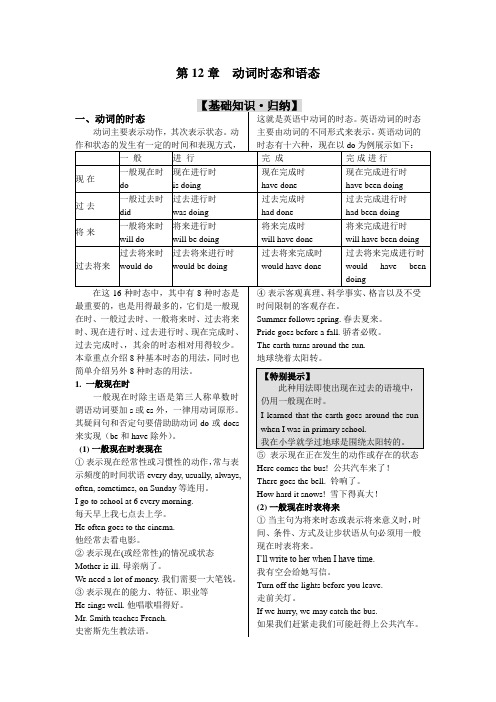
第 12 章动词时态和语态【基础知识·归纳】一、动词的时态动词主要表示动作,其次表示状态。
动 作和状态的发生有一定的时间和表现方式, 一 般 现在 过去 将来 一般现在时 do 一般过去时 did 一般将来时 will do 过去将来时 would do 进 行 现在进行时 is doing 过去进行时 was doing 将来进行时 will be doing 过去将来进行时 would be doing 这就是英语中动词的时态。
英语动词的时态 主要由动词的不同形式来表示。
英语动词的 时态有十六种,现在以 do 为例展示如下: 完 成 现在完成时 have done 过去完成时 had done 将来完成时 will have done 过去将来完成时 would have done 完成进行 现在完成进行时 have been doing 过去完成进行时 had been doing 将来完成进行时 will have been doing 过去将来完成进行时 would have been doing过去将来在这 16 种时态中,其中有 8 种时态是 最重要的,也是用得最多的,它们是一般现 在时、一般过去时、一般将来时、过去将来 时、 现在进行时、 过去进行时、 现在完成时、 过去完成时、 ,其余的时态相对用得较少。
本章重点介绍 8 种基本时态的用法, 同时也 简单介绍另外 8 种时态的用法。
1. 一般现在时 一般现在时除主语是第三人称单数时 谓语动词要加 s 或 es 外,一律用动词原形。
其疑问句和否定句要借助助动词 do 或 does 来实现(be 和 have 除外) 。
(1) 一般现在时表现在 ① 表示现在经常性或习惯性的动作, 常与表 示频度的时间状语 every day, usually, always, often, sometimes, on Sunday 等连用。
上海高三春考备考语法(时态语态二) (2)
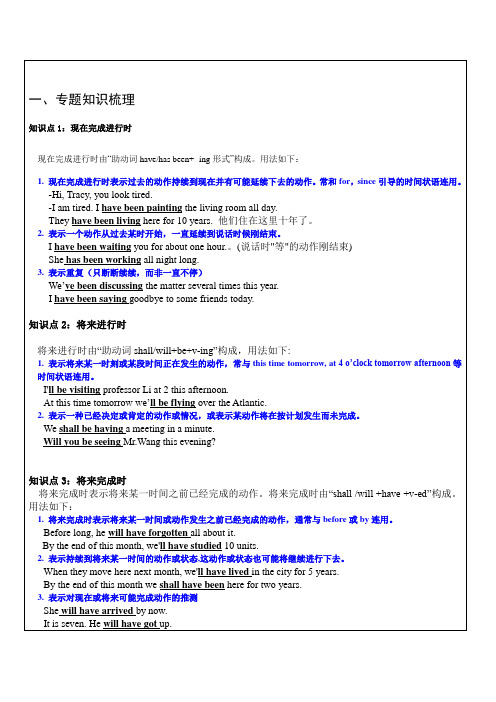
四、学法提炼一般现在时:主要考察用在从句中表将来的用法,另外,在解题中要注意‘先语态后时态’的原则。
一般过去时:主要考察无时间状语时态句,需要充分利用题中所给信息结合语境解题。
一般将来时:主要考察不同将来时表达法的应用,注意根据语境解题;另外,需要注意will表意愿的特殊用法。
一、专题知识梳理知识点1:时态之间的相互替换1. 一般现在时代替一般将来时When, while, before, after, till, once, as soon as, so long as, by the time, if, in case (that), unless, even if, whether, the moment, the minute, the day, the year, immediately等引导的时间状语从句,条件句中,用一般现在时代替将来时。
He is going to visit her aunt the day he arrives in Beijing.2. 一般现在时代替一般过去时(1)"书上说","报纸上说"等。
例如:The newspaper says that it's going to be cold tomorrow.(2)叙述往事,使其生动。
例如:Napoleon's army now advances and the great battle begins.3. 一般现在时代替现在完成时(1)有些动词用一般现在时代替完成时,如hear, tell, learn, write , understand, forget, know, find , say, remember等。
例如:I hear (= have heard)he will go to London.I forget (=have forgotten)how old he is.2)用句型" It is … since…"代替"It has been … since …"。
高考英语语法专题复习动词时态,被动语态
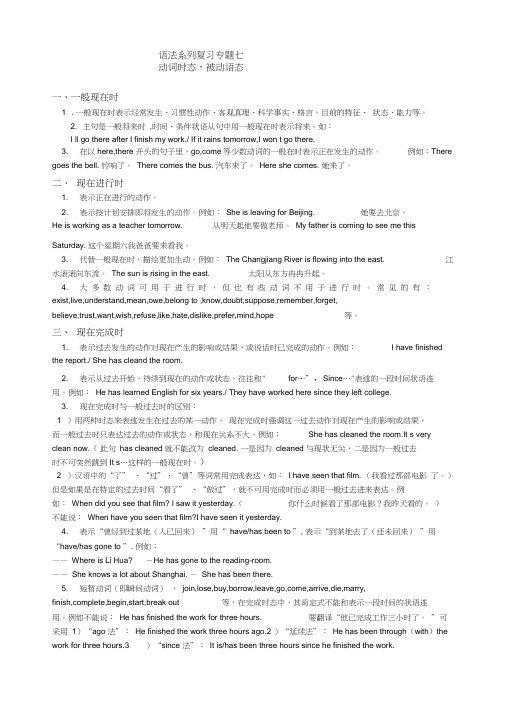
语法系列复习专题七动词时态,被动语态一、一般现在时1 . 一般现在时表示经常发生、习惯性动作、客观真理、科学事实、格言,目前的特征、状态、能力等。
2. 主句是一般将来时,时间、条件状语从句中用一般现在时表示将来。
如:I ll go there after I finish my work./ If it rains tomorrow,I won t go there.3. 在以here,there 开头的句子里,go,come等少数动词的一般在时表示正在发生的动作。
例如:There goes the bell. 铃响了。
There comes the bus. 汽车来了。
Here she comes. 她来了。
二、现在进行时1. 表示正在进行的动作。
2. 表示按计划安排即将发生的动作。
例如:She is leaving for Beijing. 她要去北京。
He is working as a teacher tomorrow. 从明天起他要做老师。
My father is coming to see me this Saturday. 这个星期六我爸爸要来看我。
3. 代替一般现在时,描绘更加生动。
例如:The Changjiang River is flowing into the east. 江水滚滚向东流。
The sun is rising in the east. 太阳从东方冉冉升起。
4. 大多数动词可用于进行时,但也有些动词不用于进行时。
常见的有:exist,live,understand,mean,owe,belong to ,know,doubt,suppose,remember,forget,believe,trust,want,wish,refuse,like,hate,dislike,prefer,mind,hope 等。
三、现在完成时1. 表示过去发生的动作对现在产生的影响或结果,或说话时已完成的动作。
高考英语动词时态和语态知识总结
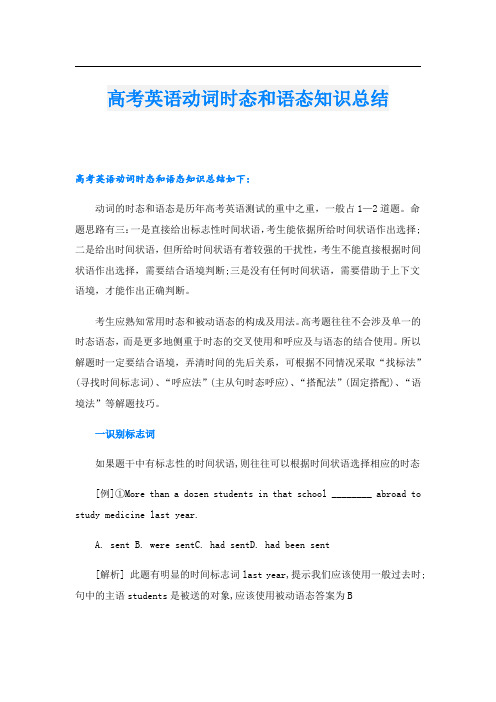
高考英语动词时态和语态知识总结高考英语动词时态和语态知识总结如下:动词的时态和语态是历年高考英语测试的重中之重,一般占1—2道题。
命题思路有三:一是直接给出标志性时间状语,考生能依据所给时间状语作出选择;二是给出时间状语,但所给时间状语有着较强的干扰性,考生不能直接根据时间状语作出选择,需要结合语境判断;三是没有任何时间状语,需要借助于上下文语境,才能作出正确判断。
考生应熟知常用时态和被动语态的构成及用法。
高考题往往不会涉及单一的时态语态,而是更多地侧重于时态的交叉使用和呼应及与语态的结合使用。
所以解题时一定要结合语境,弄清时间的先后关系,可根据不同情况采取“找标法”(寻找时间标志词)、“呼应法”(主从句时态呼应)、“搭配法”(固定搭配)、“语境法”等解题技巧。
一识别标志词如果题干中有标志性的时间状语,则往往可以根据时间状语选择相应的时态[例]①More than a dozen students in that school ________ abroad to study medicine last year.A. sentB. were sentC. had sentD. had been sent[解析] 此题有明显的时间标志词last year,提示我们应该使用一般过去时;句中的主语students是被送的对象,应该使用被动语态答案为B动词的时态一般都有其相应的时间状语,请同学们熟记下列8种常用时态所对应的时间状语(1)一般现在时:often, always, usually, seldom, now, every day等(2)一般过去时:then, yesterday, last week, after that, ago, in the following/next few months等(3)现在进行时:now, right now, at present, at this moment, these days 等(4)过去进行时:then, at that time, at this time yesterday等(5)现在完成时: recently, lately, up to/till now, so far, in the past/last few months/years…, for+一段时间, since + 一点时间等(6)过去完成时:before, by the end of last month/years…等(7)一般将来时:tomorrow, today, next week/month…, in an hour, in the coming/following few weeks等(8)过去将来时:the following month, the next week等[命题角度及对策]高考测试动词时态须与句中时间状语一致时,常在题干中加入具体情景,以测试考生对动词时态知识的实际运用能力敏锐捕捉时间标志词,并结合具体的语境,选择出正确的动词时态,是解决此类问题的良策二主从时态须呼应如果所给题干是主从复合句,可根据主从句时态呼应的原则选出正确的时态命题角度及对策]近年来高考考查主从句的时态呼应时,常放在真实的并且符合实际的语境中进行考查在根据时态呼应原则解题时,要把握好以下几点:(1)在时间条件等状语从句中,用一般现在时表示一般将来时,一般过去时表示过去将来时,用现在完成时表示将来完成时(2)正确认定主句动词及从句动词两个动作发生的时间,并认真体会命题者所给出的语境(3)解答宾语从句与主句时态呼应题时,考生应熟知以下规则:主句动词为现在时,则从句动词可根据需要使用任何时态;主句动词为过去时,则从句动词须用恰当的过去的某种时态(表示客观真理时使用一般现在时)三仔细体会语境近年来高考试题对时态语态考查的要求越来越高,大部分试题趋向情境化实际化因此,仔细体会所给语境,根据具体语境选择合适的时态是考生需要重点解决的问题例:—Do you think we should accept that offer?—Yes,we should,for we______ such bad luck up till now,and time______ out.A. have had;is runningB. had;is runningC. have;has been runD. have had;has been run【答案解析】 A。
2023年高考英语语法知识点归纳总结动词的时态和语态
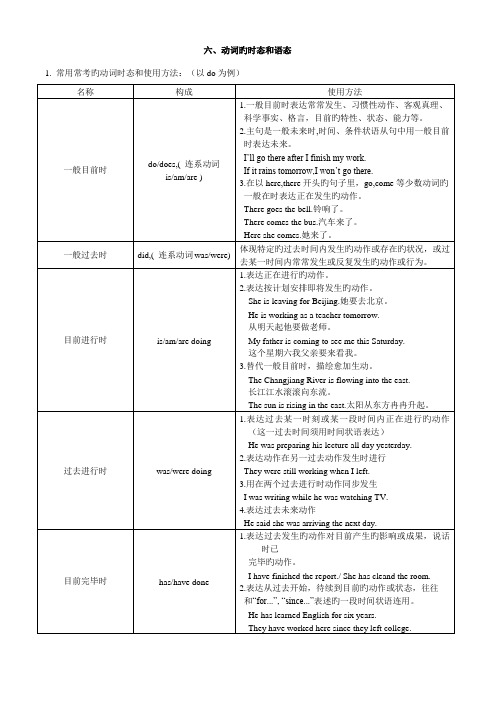
be to +动词原形
表达按计划进行或征求对方意见
We’re to meet at the school gate at noon.
4
一般目前时表未来
时刻表上或日程安排上早就定好旳事情,可用一般目前时表达未来
The meeting starts at five o’clock.
The plane leaves at ten this evening.
阐明:说话者强调Jane目前旳状况.
Mr. Lee, who ________ as a carpenter for over 10 years, is now a very famous statesman in this country.
A. has workedB. had workedC. workedD. works
长江江水滚滚向东流。
The sun is rising in the east.太阳从东方冉冉升起。
过去进行时
was/were doing
1.表达过去某一时刻或某一段时间内正在进行旳动作(这一过去时间须用时间状语表达)
He was preparing his lecture all day yesterday.
③“since法”
It is/has been threeyearssince hejoined the army.
过去完毕时
had done
1.表达在过去某一时间此前已经完毕旳动作。
He had shut the door before the dog came up.
Everything had been all right up till this morning.
高考英语常用动词时态

高考英语常用动词时态在英语中,动词时态是一种表达时间关系和动作方式的语法形式。
以下是高考英语中常用的动词时态:1、一般现在时:表示现在经常发生的动作或存在的状态。
例如:I havea book.我有一本书。
2、现在进行时:表示正在进行的动作或存在的状态。
例如:He is reading a book.他在读一本书。
3、现在完成时:表示已经完成的动作或存在的状态。
例如:I have finished my homework.我已经完成了我的作业。
4、现在完成进行时:表示从过去开始一直持续到现在的动作或状态。
例如:I have been waiting for you for two hours.我已经等了你两个小时了。
5、一般过去时:表示过去经常发生的动作或存在的状态。
例如:He lived in a small town.他住在一个小城镇。
6、过去进行时:表示在过去某个时间正在进行的动作或存在的状态。
例如:They were watching TV at that time.他们在那个时候正在看电视。
7、过去完成时:表示从过去某个时间开始一直持续到现在的动作或状态。
例如:He had worked in this company for five years before he left.他离开前在这家公司工作了五年。
8、一般将来时:表示将来经常发生的动作或存在的状态。
例如:I will go to school tomorrow.我明天要去上学。
9、将来进行时:表示将来某个时间正在进行的动作或存在的状态。
例如:They will be having a meeting tomorrow afternoon.他们明天下午将开会。
10、将来完成时:表示从将来某个时间开始一直持续到未来的动作或状态。
例如:He will have finished his homework by the end of this week.他将在这个周末之前完成他的作业。
上海高三春考备考语法(时态语态一)

1. 一般现在时:主要考察用在从句中表将来的用法,另外,在解题中要注意‘先语态后时态’的原则。
2. 一般过去时:主要考察无时间状语时态句,需要充分利用题中所给信息结合语境解题。
3. 一般将来时:主要考察不同将来时表达法的应用,注意根据语境解题;另外,需要注意will表意愿的特殊用法。
一、专题知识梳理知识点1:现在进行时1.表示说话人说话时正在进行的动作,它不涉及该动作的发生和结果,译成汉语“正在”,这一用法常和表示此刻的时间状语连用,如now, at this time, at present,at the moment等。
I'm doing my homework now.It's raining hard.2.表示现阶段但并非眼下正在进行着的动作,这种动作常与表示一段的时间状语连用,如these days , this week 等。
He is writing a novel now.3.表示将来的动作表示某个按最近的计划或安排将要进行的动作,或即将开始或进行的动作。
常用的这类词go, come, leave, stay, start, arrive, land, meet, move, return, stay, stop, do, dine等,通常要与表示将来的时间状语连用,以区别此刻正在进行的动作。
He is coming to see you tomorrow.His sister is leaving for Hong Kong tomorrow.4、表达褒贬等感情色彩和always ,forever, continually, constantly, instantly, continuously等频度副词连用,表示经常、反复发生的动作,不强调动作的进行性。
表达厌烦、愤怒、抱怨、赞扬等情感。
He is constantly leaving his things about.(表责怪)She is always changing her clothes.(表责怪)He is always working hard.(表赞赏)They’re forever quarrelling about something. (不满)5.wonder, hope, think 等表示心理的动词用于进行时可以表示婉转的语气I’m wondering if I may come a little late.I’m hoping you’ll give us some suggestions.知识点2:过去进行时1.表示过去某一时刻正在或过去某段时间正在进行的动作。
高考语法第一讲动词时态

高考英语语法专题动词时态动词时态(tense)就是一种动词形式,不同得时态用以表示不同时间里所产生得动作或存在得状态。
动词时态分类:1. 高考真题解析1、 Months ago we sailed ten thousand miles across this open sea, which ______ the Pacific, and we met no storms 、 (辽宁卷)A 、 was calledB 、 is calledC 、 had been calledD 、 has been called 2、 “What would you do if it _________tomorrow?” “We have to carry it on, since we’ve got everything ready 、” (全国卷I)A 、 rainB 、 rainsC 、 will rainD 、 is raining3、 As soon as he es back, I’ll tell him when _________and see him 、 (北京卷)A 、 you will eB 、 will you eC 、 you eD 、 do you e4、 “If the traffic hadn’t been so heavy, I could have been back by 6 o’cl ock 、” “What a pity! Tina _________ here to see you 、” (湖南卷)A 、 isB 、 wasC 、 would beD 、 has been5、—Is Peter ing?—No, he____ his mind after a phone call at the last minute 、(2015 重庆,1)A. changes B 、 changed C 、 was changing D 、 had changed 6、 “Did you tell Julia about the result?” “Oh, no, I forgot 、 I _________her now 、” (全国卷III)A 、 am going to call B、 will call C 、 call D 、 am to call7、 “What are you going to do this afternoon?” “I am going to the cinema with some friends 、 The film _________ quite early, so we _________ to the bookstore after that 、” (重庆卷)A 、 finished, are goingB 、 finished, goC 、 finishes, are goingD 、 finishes, go高考真题解析1、Listen to the two girls by the window、What language _________? (全国卷III)A、did they speakB、were they speakingC、are they speakingD、have they been speaking2、“Are you still busy?” “Yes, I _________ my work and it won’t take long、” (浙江卷)A、just finishB、am just finishingC、have just finishedD、am just going to finish3、Susan decided not t o work on the program at home because she didn’t want her parents to know what she _________、(辽宁卷)A、has doneB、had doneC、was doingD、is doing高考真题解析1、Years ago we didn’t know this, but recent science _________ that people who don’t sleep well soon get ill、(广东卷)A、showedB、has shownC、will showD、is showing2、He was hoping to go abroad but his parents _________ that they won’t support him unless he can borrow money from the bank、(湖北卷)A、were decidingB、have decidedC、decidedD、will decide3、My brother is an actor、He _________in several film so far、(浙江卷)A、appearsB、appearedC、has appearedD、is appearing4、The country life he was used to _________ greatly since 1992、(山东卷)A、changeB、has changedC、changingD、have changed5、In my hometown, there is always a harvest supper for the farmers after all the wheat____ cut、(2015 重庆,13)A、will have beenB、will beC、wasD、has been6、Our teacher told us that Columbus discovered America in 1492、He _________more than 5,000 English words when he entered the university at the age of 15、(北京卷)A、has learnedB、would have learnedC、learnedD、had learned7、When the old man _________ to walk back to his house, the sun _________ itself behind the mountain、(湖北卷)A、started; had already hiddenB、had started; had already hiddenC、had started; was hidingD、was starting; hid8、、Father _________for London on business upon my arrival, so I didn’t see him、(福建卷)A、has leftB、leftC、was leavingD、had left9、The policeman’s attention was suddenly caught by a small box which _________ placed under the Mi nister’s car、(广东卷)A、has beenB、was beingC、had beenD、would be10、“Hurry up! Alice and Sue are waiting for you at the school gate、” “Oh ! I thought they _________ without me、” (江西卷)A、wentB、are goingC、have goneD、had gone语法My best friend Kaiya is like me 、She _______(remind) me of myself 、In the past , I ______(be) never confident because of my appearance 、People always laughed at my weight , my weight , my hairstyle , etc 、At that time , I was the shortest student in my class 、I started getting depressed 、However , someone told me something that i will always remember 、It was in March 、Surrounded by a group of girls who _____(point) at me and laughed at me 、i couldn’t help crying 、The tears rolled down my face like a rushing river 、To my surprise , someone lifted my head up and wiped the tears from my eyes 、I then knew it was our English teacher , Miss Li 、She said , “You _____(be ) perfect the way you are 、You should never change or hate yourself 、People ______(accept ) you for who you are 、But if you cannot accept yourself , then how will other people accept you ?” I ________(inspire) by her words 、Over the past few months 、I_____________(learn) that no one is perfect and that we all have flaws 、Now , seeing Kaiya cry , I decide to tell her the same thing Miss Li _________(tell) me 、1、A:Hey, John 、_______ are you doing this weekend ?B: Not much , mark 、I don’t really have any plans yet 、A: ______ you ever been to the space museum?B: Yes , I have 、I ________(go) there last month 、A: Oh, how ____(be) it ?B: It was great 、I ________ been there many times 、A: I see 、I ______ never ________ there 、B: Well , let’s go this weekend then 、I don’t mind going again 、I thin k there’s something new there 、I ___________not see it last time 、2、A: Have you _______(seen ) the robots at the science museum ?B: Yes, I _______(go )there last weekend 、3、Let’s _______(spend) the day at the zoo 、Well , I’ve already _______ there a couple of times , but I’m happy _________(go) again 、4、Last year I _______(go) to the Hangzhou National Tea Museum 、5、It’s unbelievable the technology __________(progress) in such a rapid way !6、I went there once when I ______(be) 10 years old , but I ______ not been back since then 、7、I ______(visit) the Palace Museum three times 、9、There _____(be ) a sports meeting next week 、10、Linda ________(see) the movie many times , so she _______(not see) yesterday 、高考题1、Jack _____(work) in the lab when the power cut occurred 、2、Excuse me , which movie are you waiting for ?The new Star Wars 、We ________(wait ) here for more than 2 hours 、3、In the last few years , China ______(make ) great achievements in environment protection 、4、The sun was setting when my car ____ (break )down near a remote village 、5、People stepped on your feet or _________(push) you with their elbows , hurrying ahead to get to a bargain 、6、All the visitors to this village ________(treat) with kindness a week ago 、阅读下面短文,在空白处填入1个适当得单词或括号内单词得正确形式In 1863the first underground passenger railway in the world opened in London、It ran for just under seven kilometers and allowed people to avoid terrible __61__(crowd) on the roads above as they travelled to and ___62__ work、It took three years to plete and was built using an interesting method、This included digging up the road, ____63___(lay) thetrack and then building a strong roof over___64___ top、When all those had been done, the road surface was replaced、Steam engines ___65__(use) to pull the carriages and it must havebeen___66__(fair)unpleasant for the passengers, with all the smoke and noise、However, the railway quickly proved to be a great success and within six months, more than 25,000 people were using___67__ every day、Later, engineers ____68___(manage) to construct railways in a system of deep tunnels (隧道), which became known to the tube、This development was only possible with the___69___ (introduce) of electricpowered engines and lifts、The central London Railway was one of the most ___70___(success) of these new lines, and was opened in 1900、It had whitepainted tunnels and bright red carriages, and proved extremely popular with the public、。
广东高三春考英语知识点

广东高三春考英语知识点广东高三春考即将到来,英语成绩对于学生升学和发展起着重要的作用。
为了帮助广东高三学生更好地复习和备考英语,本文将总结一些重要的英语知识点,并提供相应的复习方法和技巧。
一、语法知识点1. 时态:强调过去发生的动作使用过去时态,表达现在正在进行的动作使用现在进行时态,表达将来的动作使用将来时态等。
2. 名词:区分可数名词和不可数名词,使用单数和复数形式,以及名词所有格等。
3. 代词:区分人称代词和物主代词的用法,注意主格和宾格的区别,以及反身代词的使用。
4. 形容词与副词:区分形容词和副词的用法,掌握比较级和最高级的变化规则,学会形容词与副词修饰的对象。
5. 介词:注意介词与动词、名词、形容词等的搭配,掌握常用介词的用法和固定搭配。
6. 连词:学会连接主句和从句的连词的用法,掌握并列连词、递进连词、转折连词等的不同用法。
二、阅读技巧与题型分析1. 阅读理解:具体题型有细节理解题、主旨大意题、推理判断题、词义猜测题等。
在阅读理解中,重要的是培养快速阅读和理解的能力,注意文章结构和段落标志词的作用。
2. 完形填空:完形填空要求考生在短文中选择合适的单词或短语。
正确答题的关键是理解短文的主题和整体结构,抓住关键词辅助答题。
3. 非选择题:常见类型有填空题、改错题、书面表达等。
这些题目要求学生对所学的语法、词汇和写作技巧有较好的掌握。
三、写作技巧与范文示例1. 书信类作文:书信类作文通常包括投诉信、感谢信、建议信、求职信等。
写信时要注意写信格式、开头和结尾的礼貌用语,并结合具体要求合理组织文章。
2. 议论文:议论文要求学生对一个问题进行观点陈述和分析,通常包括引言、正文和结论三个部分。
写作时要注意观点表达的逻辑性和连贯性,以及有效的论证和举例。
3. 图表类作文:图表类作文要求学生对所给的图表进行描述、分析和归纳总结。
注意提炼关键信息,合理组织作文结构,以及使用适当的句型和词汇进行描述。
高考英语语法考点:动词时态和语态
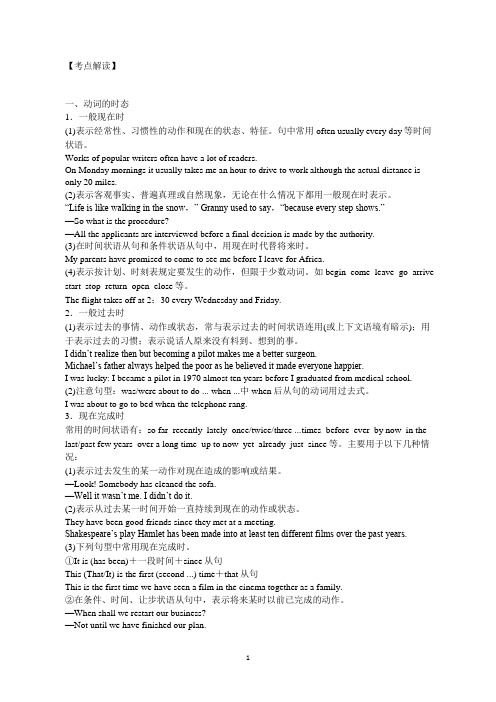
【考点解读】一、动词的时态1.一般现在时(1)表示经常性、习惯性的动作和现在的状态、特征。
句中常用often usually every day等时间状语。
Works of popular writers often have a lot of readers.On Monday mornings it usually takes me an hour to drive to work although the actual distance is only 20 miles.(2)表示客观事实、普遍真理或自然现象,无论在什么情况下都用一般现在时表示。
“Life is like walking in the snow,” Granny used to say,“because every step shows.”—So what is the procedure?—All the applicants are interviewed before a final decision is made by the authority.(3)在时间状语从句和条件状语从句中,用现在时代替将来时。
My parents have promised to come to see me before I leave for Africa.(4)表示按计划、时刻表规定要发生的动作,但限于少数动词。
如begin come leave go arrive start stop return open close等。
The flight takes off at 2:30 every Wednesday and Friday.2.一般过去时(1)表示过去的事情、动作或状态,常与表示过去的时间状语连用(或上下文语境有暗示);用于表示过去的习惯;表示说话人原来没有料到、想到的事。
I didn’t realize then but becoming a pilot makes me a better surgeon.Michael’s father always helped the poor as he believed it made everyone happier.I was lucky: I became a pilot in 1970 almost ten years before I graduated from medical school.(2)注意句型:was/were about to do ... when ...中when后从句的动词用过去式。
高考复习动词的时态和语态

现在完成时的用法 现在完成时由“have+过去分词”构成。其使用有两种情况: 表示的动作在说话之前已完成, 而对现在有影响, 句中没有具体时间状语。 e.g. He has gone to Fuzhou. (说话人认为他 不在此地) He has been to Fuzhou. (说话人认为他 在此地)
在时。 e.g. Xi meets journalists.
01
在时代替将来时。 e.g. If you come this afternoon, we’ll have a meeting.源自020102
03
04
表示过去某时间发生的事、存在的状
态或过去反复发生的动作。
e.g. He saw Mr. Wang yesterday.
状态持续到过去某个时间或持续下去。
hours.
表示过去某一时刻之前发生的动作或
e.g. Before he slept, he had worked for 12
表示从过去的某时间看来将要发生的动作或存在的状态。由“should或would+动词原形”构成。第一人称用should, 其他人称用would。
e.g. The bridge is under construction.
注意:下列动词不宜用进行时
注意:下列动词不宜用进行时 ① 感觉类:look, smell, feel, sound, taste, see, hear等; ② 感情类:like, love, prefer, admire, hate, fear等; ③ 所有类:have, contain, own, hold, belong to等。
表示现在正在进行的动作。
过去进行时
was/were doing
(完整word)春季高考英语语法专项复习——动词时态
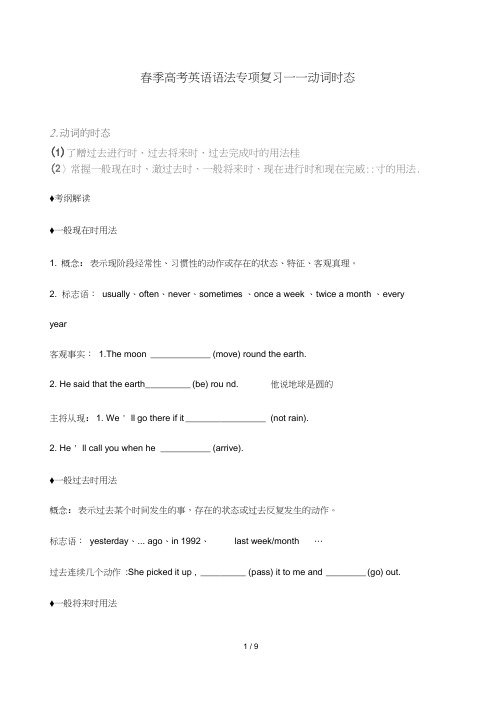
春季高考英语语法专项复习一一动词时态2.动词的时态(1)了赠过去进行时、过去将来时、过去完成吋的用法桂(2〉常握一般现在时、澈过去时、一般将来时、现在进行时和现在完威::寸的用法. ♦考纲解读♦一般现在时用法1. 概念:表示现阶段经常性、习惯性的动作或存在的状态、特征、客观真理。
2. 标志语:usually、often、never、sometimes 、once a week 、twice a month 、every year客观事实: 1.The moon ____________ (move) round the earth.2. He said that the earth _________ (be) rou nd. 他说地球是圆的主将从现:1. We ' ll go there if it ________________ (not rain).2. He ' ll call you when he __________ (arrive).♦一般过去时用法概念:表示过去某个时间发生的事,存在的状态或过去反复发生的动作。
标志语:yesterday、... ago、in 1992、last week/month …过去连续几个动作:She picked it up , _________ (pass) it to me and ________ (go) out.♦一般将来时用法概念:表示将来某个时间要发生的动作或存在的状态。
结构: will do 、shall do 、be going to do 、be about to do 、be to do标志语:tomorrow 、n ext week/m on th... 、in …、tomorrow mornin g/eve ning …主将从现:I ________ call you as soon as I get there tomorrow morning.现在进行时表将来: The bus ________________ (come).♦现在进行时用法概念: 表示现在正在发生的动作。
超实用高考英语复习语法专题:动词时态语态

4 现在进行时怎样使用?
翻译下列句子,指出现在进行时的时态含义 1. Hold on! I am writing a letter. 等等, 我正在写信。表说话时正在写信。
2. Cheers! I know you are translating a famous novel. 干杯,听说你正在翻译一本著名的小说。表示现阶 段正在进行翻译工作(说话时不在翻译)。
从句中表示将来。
3
一般现在时表示经常反复发生的习惯性行为动作 或 所 处 的 状 态 。 常 见 时 间 状 语 有 : often , usually, always, sometimes, every day, once a week, on Sundays, never等。 一般现在时主要用法有:
2
【答案】 16.过去将来完成进行时: 主语+should/would
+ have been doing+其他
2
把时间分为四个阶段:“现在、过去、将来、过去 将来”把英语动词所表示的动作在以上每个时间段中 分别有四种状态:一般、进行、完成和完成进行,因 此英语中共有16种时态。
3 一般现在时怎样使用?
4
6. It's getting colder and colder.
天气变得越来越冷。get用于进行时态表示一个 逐渐变化的过程。
4
现在进行时一般表达说话时间或现阶段正在 发生的动作,常见时间状语有now,at the moment, at present。主要用法有:
1.表示说话时正在发生或进行着的动作; 2.表示现阶段正在进行的动作(说话时不一定 正在进行); 3.表将来。用进行时表将来的动词通常为短 暂
2
【答案】 7.过去完成时: 主语+had done+其他 8.过去完成进行时: 主语+had been doing+其他 9.一般将来时 : 主语+shall/will+do+其他 10.将来进行时: 主语+shall/will be +doing+其
高考英语动词的时态知识点梳理
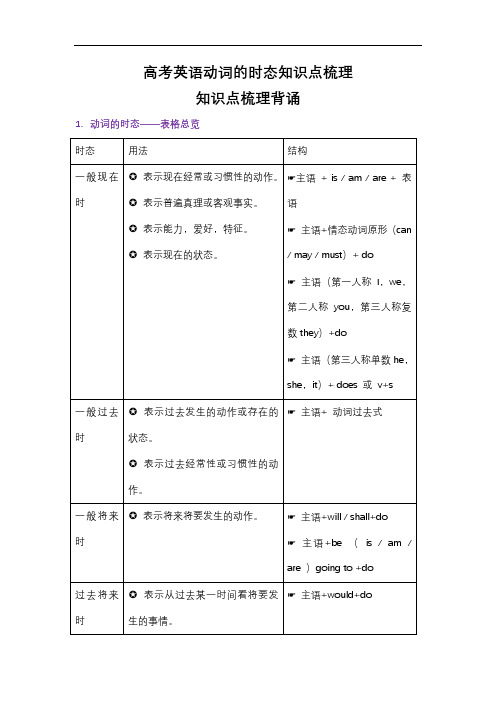
高考英语动词的时态知识点梳理知识点梳理背诵1.动词的时态——表格总览2. 动词的时态——数轴展示易错知识点1. 一般过去时与现在完成时的误用☆一般过去时表示过去某个时间发生的动作或情况,也表示过去习惯性动作,特别是由would/used to do表达的句型,本身表示的就是过去时。
☆现在完成时表示过去的动作对现在造成的影响;也表示过去的动作持续到现在,可能继续发生下去。
1.1 易错例题1The president hopes that the people will be better off when he quits than whenhe ______.A. has startedB. startsC. startedD. will start【陷阱】本题前面是一般将来时,后面横线,学生容易用现在完成时,误认为是从过去一开始任职到现在为止的过程。
【分析】最佳答案是C。
根据句意判断“开始当总统”是过去的事情,并且start 是非延续性动词,不可以直接用于现在完成时,所以本题应用一般过去时。
【考题拓展】----Look! Somebody ______ the sofa.----Well, it wasn't me. I didn't do it.A. is cleaningB. cleanedC. has cleanedD. had cleaned【陷阱】考生看到look一词,或者看到下面的答句,容易选A或者B。
【分析】最佳答案C。
根据“Look!”一词可知此处是指现在“有人把沙发清理干净了”,并且根据答句,可知清理的动作发生在过去,强调过去的动作对现在的影响,所以用现在完成时。
【点拨】▲当有表示具体过去时间的状语(包括when)时,主句用一般过去时。
如:When I was a child, I often played football in the street.▲当有表示一段时间的状语,如for和since表示时间时,主句用现在完成时,强调到现在为止所做的事情或过去所做之事对现在的影响。
- 1、下载文档前请自行甄别文档内容的完整性,平台不提供额外的编辑、内容补充、找答案等附加服务。
- 2、"仅部分预览"的文档,不可在线预览部分如存在完整性等问题,可反馈申请退款(可完整预览的文档不适用该条件!)。
- 3、如文档侵犯您的权益,请联系客服反馈,我们会尽快为您处理(人工客服工作时间:9:00-18:30)。
春季高考英语语法专项复习——动词时态◆考纲解读◆一般现在时用法1.概念: 表示现阶段经常性、习惯性的动作或存在的状态、特征、客观真理。
2.标志语:usually、often、never、sometimes、once a week、twice a month、every year客观事实:1.The moon _____________ (move) round the earth.2. He said that the earth _________ (be) round. 他说地球是圆的主将从现: 1. We’ll go there if it _________________ (not rain).2. He’ll call you when he __________ (arrive).◆一般过去时用法概念: 表示过去某个时间发生的事,存在的状态或过去反复发生的动作。
标志语:yesterday、... ago、in 1992、last week/month…过去连续几个动作: She picked it up ,_________ (pass) it to me and ________ (go) out.◆一般将来时用法概念: 表示将来某个时间要发生的动作或存在的状态。
结构: will do、shall do、be going to do、be about to do、be to do标志语:tomorrow、next week/month...、in...、tomorrow morning/evening…主将从现:I _________ call you as soon as I get there tomorrow morning.现在进行时表将来: The bus ________________(come).◆现在进行时用法概念: 表示现在正在发生的动作。
标志语:Look! 、Listen! 、now一直进行: He ____________(write) a novel this year.◆现在完成时用法1.概念: 表示过去发生或已经完成的动作对现在产生的影响或结果结构: has/have+done(及物动词的过去分词)标志语:already、yet、ever、never、since、for、just…He ______________(work) here for a year.两“去”:He ____________ to China twice.He isn’t here. He _____________ to the library.注意: 表示短暂动作的动词,如come, go, leave, finish, buy, marry, die 等的完成时态不能和for, since等表示一段时间的状语连用。
但可以用表示相同意思的其他延续性动词或短语代替。
例如:误:I have come to Beijing for half a year.正:I have been in Beijing for half a year.◆过去进行时1.概念: 表示过去某一时刻或某一阶段正在进行或发生的动作结构: be (was,were) + 动词现在分词(doing)标志语:at 8:00 yesterday 、when、while、…Eg: I was doing my homework at eight yesterday.◆过去将来时概念: 表示从过去某一时间来看将要发生的动作或存在的状态。
结构: would do、be (was、were) going to do标志语:常用于主句是一般过去时的宾语从句中Eg:Betty said she would visit her uncle next Saturday.◆过去完成时概念: 表示在过去某一时间或动作之前已经发生或完成的动作。
它所表示的动作发生的时间是“过去的过去”。
这一过去时间用by, before等介词短语;when, before等引导的时间状语从句或通过上下文来表示。
结构: had doneEg:The film had been on for five minutes when I got to the cinema.(我到电影院时电影已经开演五分钟了。
)专项练习1. If he ___ early tomorrow, he’ll be late.A. doesn’t get upB. won’t get upC. gets upD. doesn’t gets up2. I _____ my mobile phone since five years ago.A. boughtB. have boughtC. had boughtD. have had3.---Have you seen Bill? ---Yes, he_____to the library.A. has goneB. had goneC. has beenD. went4. —Mike wants to know if ___ a picnic tomorrow.—Yes. But if it____, we’ll visit the museum instead.A. you have...will rainB. you will have...will rainC. you will have...rainsD. will you have...rains5. —Do you know him well?—Sure. We _____ friends since ten years ago.A. wereB. have beenC. have becomeD. have made6. —May I speak to John?—Sorry, he ______ Japan. But he _______ in two days.A. has been to, will come backB. has gone to, will be backC. has been in, would come backD. has gone to, won't come back7.The teacher told us in class that the earth ______ around the sun.A. movesB. movedC. is movingD. to move8.Oh, the milk _____strange,do you think it’s OK to drink?A. was tastedB. tastedC. is tastingD. tastes9. —Are you going to see the film with us? —No, I _____ it twice.A. seeB. was seeingC. would seeD. have seen10. He _______ to play basketball with us if he _____ free tomorrow.A. comes; isB. comes; will beC. will come; will beD. will come; is11. There______ a concert tomorrow evening.A. will have beB. is going to haveC. will haveD. is going to be12. Great changes _______in my hometown since 1988.A. have been taken placeB. have taken placeC. had taken placeD. had been taken place13. My father ______ Beijing for two years.A. has been toB. has gone toC. has been inD. goes14. —Do you know if he ______ to play basketball with us?—I think he will come if he______ free tomorrow.A. comes, isB. comes, will beC. will come, isD. will come, will be15. Don’t cry any more. The baby ______.A. was sleepingB. sleepC. is sleepingD. slept16. —Where is your cat? I haven’t seen it for a long time.—Oh, it ________. It ________ about ten days ago.A. died; is deadB. has died; has diedC. was dead; has diedD. is dead; died17. If he _________ tomorrow, he will be late.A. don’t startB. didn’t startC. doesn’t startD. won’t start18. —We'll go for a picnic if it _______ this Sunday.—Wish you a lovely weekend.A. isn’t rainB. doesn't rainC. won't rain D didn’t rain19. —Did you meet the writer at the station?—No. He_______ by the time I got there.A. has leftB. was leavingC. had leftD. left20. A talk on American history_______ in the school hall next week.A. is givenB. has been givenC. will be givenD. gives21.I like my new bike. It ______ very well.A rides B. is riding C. is ridden D. has ridden22.Cotton ______ nice and soft.A. is feltB. is feelingC. feelD. feels23.The world ______. Things never stay the same.A. changesB. is changingC. was changingD. will change24.—Have you ever______ Lintong to see the Terra Cotta Warriors? —Yes, I have.A. went toB. gone toC. been inD. been to25.I'm sorry you've missed the train, It______10 minutes ago.A. leftB. has leftC. had leftD. has been left26.—Who cleaned the blackboard yesterday, Dick? —John ______.A. cleanedB. doesC. didD. is27.—Mum? May I go out and play basketball?—______ you_____ your homework yet?A. Do; finishB. Are; finishingC. Did; finishD. Have; finished28.—Oh, Mrs King, your necklace looks nice. Is it new?—No, I______ it for two years.A.hadB. have hadC. boughtD. have bought29.—Will your mother______ you if you______ the English exam?—Of course not. Because I am trying my best.A. be angry with, don't passB. be angry with, won't passC. be angry to, don't passD. be angry to, won't pass30.Listen! Some of the girls ______ about Harry Potter . Let's join them!A. are talkingB. talkC. will talkD. talked31.Our teacher , Miss Chen, ______ English on the radio the day before yesterday.A. teachesB. taughtC. will teachD. had taught32.I don't think I ______ you in that dress before.A. have seenB. was seeingC. sawD. see33. She will have a holiday as soon as she ___________ the work next week.A. finishesB. doesn't finishC. will finishD. won't finish34. —I won't come to the party unless Sue ______, too.—You mean if Sue comes you'll come?A. will inviteB. invitesC. invitedD. is invited35.A talk on Chinese history ___ in the school hall next week.A. be givenB. has been givenC. will be givenD. will give36. You may go fishing if your work ____________.A. is doneB. will be doneC. has doneD. have done37.—Where is Mr. Green now ? I haven't seen him for a few days.—He ___________ to Hong Kong .A. goesB. will goC. is goingD. has gone。
